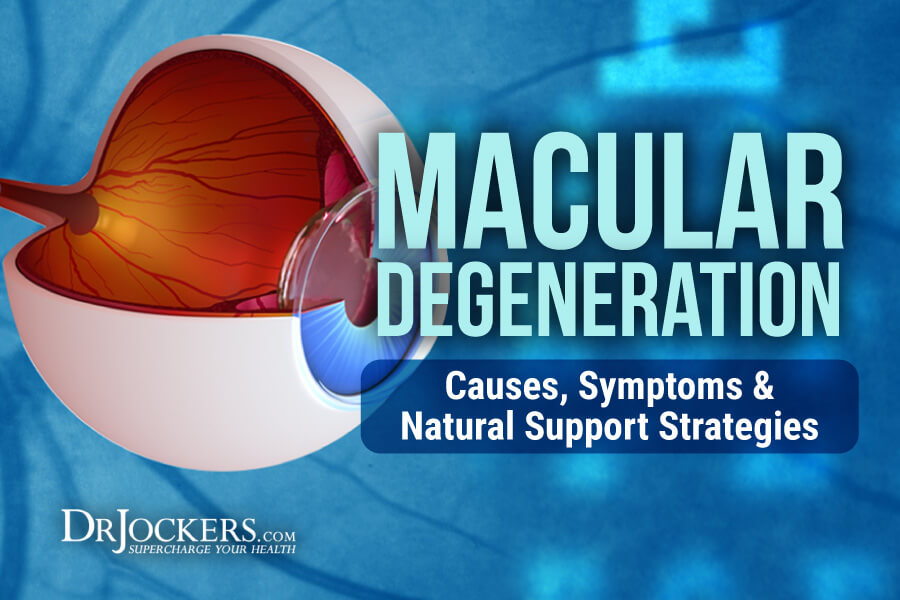 Macular Degeneration: Causes, Symptoms & Natural Support Strategies
Macular Degeneration: Causes, Symptoms & Natural Support Strategies
Macular degeneration is a prevalent age-related eye condition that causes vision changes and may result in ‘legal blindness’. As the growing population over 65 in the US increases, the number of people with macular degeneration is expected to grow. By 2050, the number of people with age-related vision loss is expected to grow to nearly 22 million.
Clearly, macular degeneration is an important issue we need to understand and pay attention to in order to prevent and slow it. While age is one of the factors that may cause macular degeneration, there are other factors that may also play a role, including a poor diet, nutrient deficiencies, diabetes, smoking, stress, poor sleep, and poor lifestyle choices.
In this article, you will learn what macular degeneration is, its symptoms, and its main causes. I will share with you some great natural support strategies to improve your eye health (1).
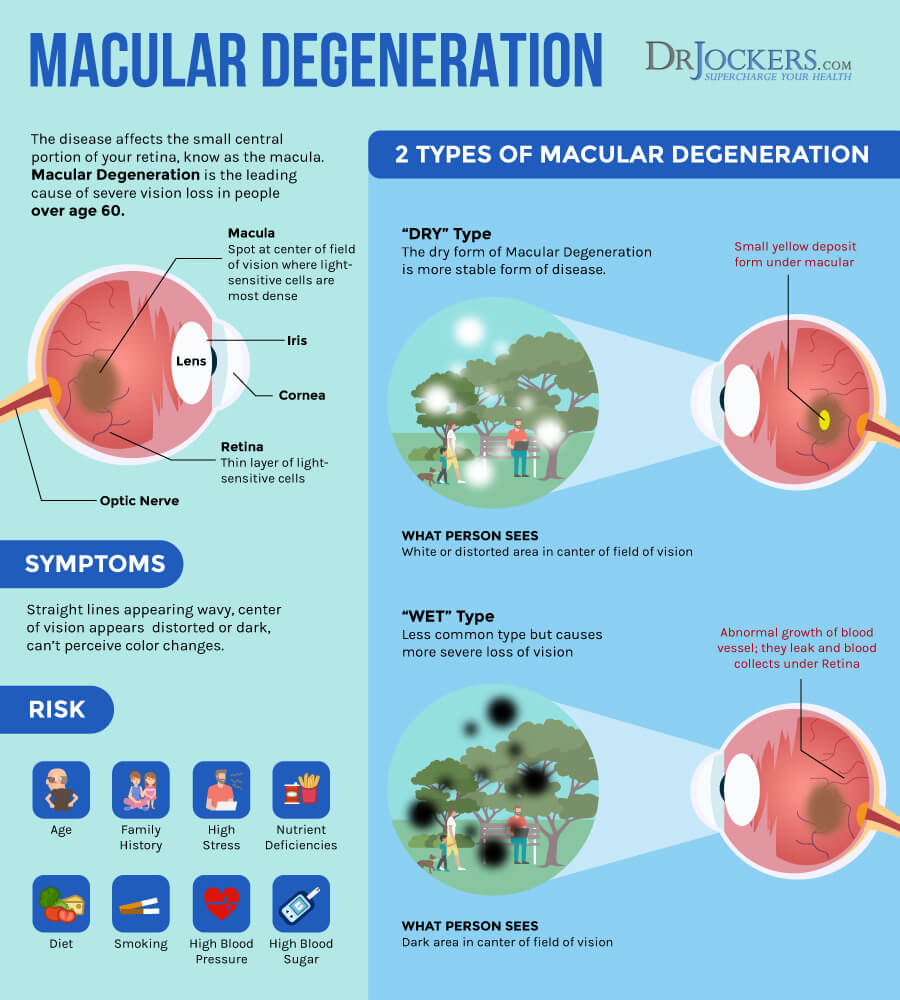
What Is Macular Degeneration
Macular degeneration is an eye condition. It affects your retina and results in vision changes. For example, you may see lines or other things becoming blurred, distorted, spotted, or dark.
Your retina is an important part of your eye. It is the lining of the nerves found at the back of your eyes. They respond to light and help your eyes to interpret light wavelengths and understand images. They basically help you see. The macula is in the center of the retina. When macular degeneration occurs, your retina’s health becomes compromised, and your vision changes (2).
Macular degeneration is most common among people over age 60 and is often referred to as an age-related condition, or age-related macular degeneration (AMD). People may experience wet or dry macular degeneration with the dry type making up 90 percent of all cases. However, the dry form precedes the wet form, which may lead to worsened vision loss. Wet macular degeneration results in leaky blood vessels, bleeding, swelling, and even legal blindness (3, 4).
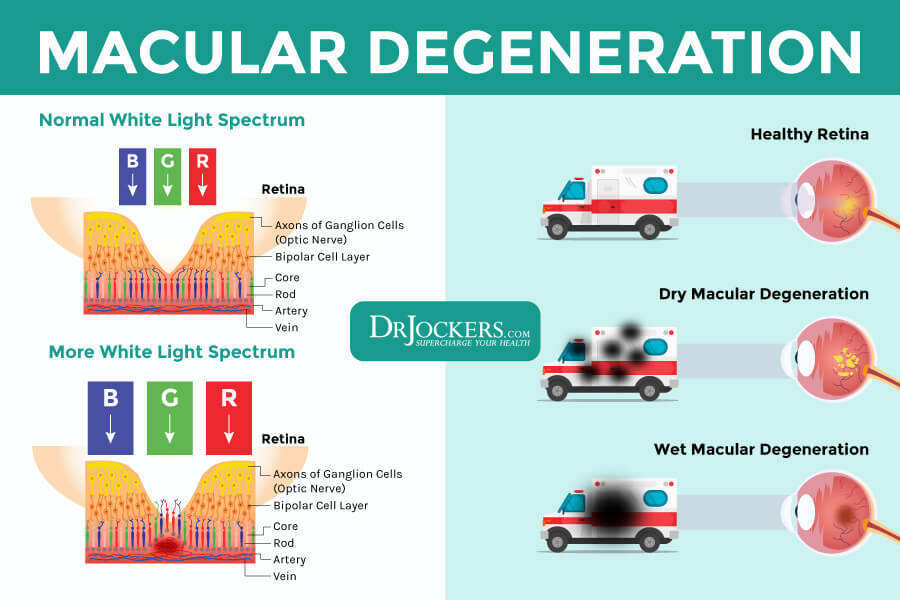
Stages of Macular Degeneration
Macular degeneration has three stages (5):
- Early stage: People at this stage do not experience vision loss yet but may be diagnosed by the presence of medium-sized drusen, or yellow deposits just below the retina.
- Intermediate stage: People at this stage may experience some vision loss but not significant yet, however, larger drusen or pigment changes of the retina become more prevalent.
- Late stage: People at this stage experience more significant and noticeable vision loss.
Main Symptoms of Macular Degeneration
Macular degeneration may have a variety of signs and symptoms that may differ from person to person. Some of the main symptoms of macular degeneration include:
- Blurry or fuzzy vision
- Difficulty reading, especially in low light
- Difficulty seeing details in low light levels
- Blurred central vision
- Straight lines appear distorted or wavy, for example, when reading sentences on a page
- Blurry areas on a printed page
- Extra sensitivity to glare
- Some colors become darker
- Trouble with everyday activities, such as reading
Visiting your eye doctor for a yearly check-up is generally important. However, if you notice any of these symptoms, it is critical that you visit your eye doctor, as well as talk to your general healthcare practitioner.
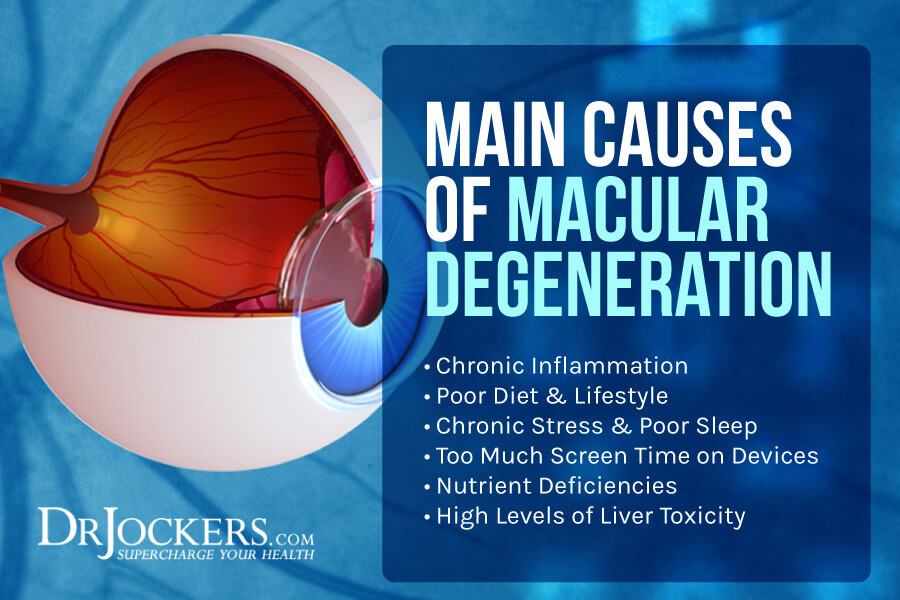
Main Causes of Macular Degeneration
While macular degeneration is often referred to as an age-related condition, it is not simply your age that causes it. The root cause of the development of macular degeneration is often the combination of poor dietary and lifestyle choices. Let’s look at them one by one.
Chronic Inflammation
Macular degeneration is the result of inflammation, damage, and changes of the nerves, tissues, and cells in your eyes and changes to your retinal pigment epithelium (RPE), photoreceptors, choriocapillaris (small blood vessels), and Burch’s membranes. This inflammation may lead to damage to your retina and macula cells and thus lead to vision changes.
However, inflammation doesn’t just happen in one area of your body. Chronic inflammation can result in specific inflammation and inflammation-related health conditions, including in your eyes. Chronic inflammation may develop due to an inflammatory diet, unhealthy lifestyle choices, poor sleep, and chronic stress.
Research has found that chronic inflammation is one of the root causes of most modern-day diseases and is detrimental in the development of a variety of age-related conditions. It is associated with cardiovascular disease, diabetes, neurodegenerative states, and vision problems. Research has linked inflammation to macular degeneration (6).
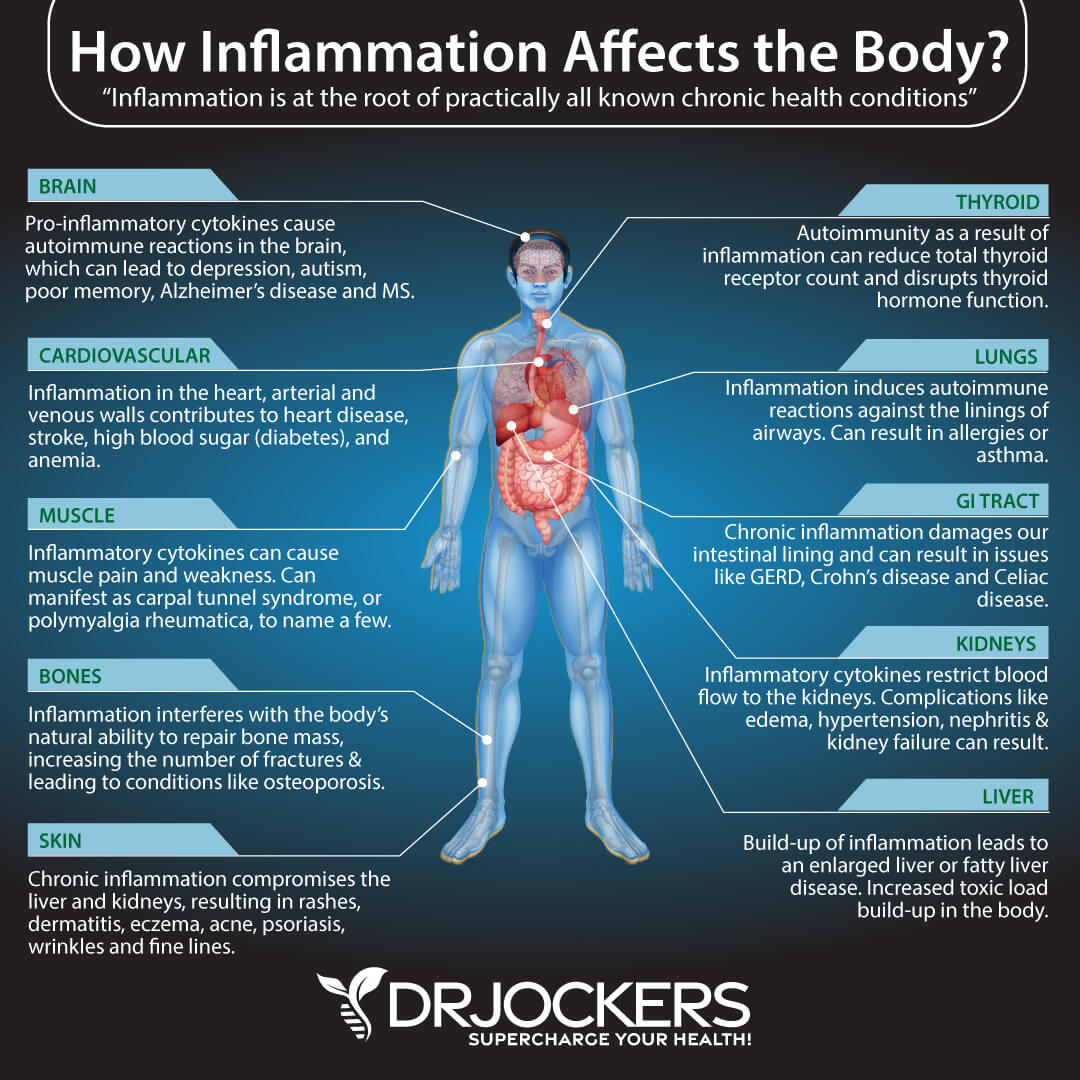
Poor Diet & Lifestyle
Your diet and lifestyle choices have everything to do with your health. Healthy lifestyle choices include regular exercise, a nutrient-dense diet, time in nature, maintaining a healthy weight, reducing stress, and reducing your exposure to chemicals. Without paying attention to these factors, you increase your risk of inflammation.
Eating a poor diet full of refined sugar, refined oil, processed foods, and junk food with little to no greens, vegetables, fruits, healthy fats, and clean protein will lead to increased chronic inflammation in your body. Add poor lifestyle choices, such as no exercise, stress, poor sleep, and chemical exposure and you increase your risk of inflammation and macular degeneration even more (7).
You probably know that smoking can lead to lung problems, including lung cancer, but you may not be aware that it may also lead to macular degeneration and other health issues. You may be shocked to learn that cigarette smoke contains 4,700 chemicals that are incredibly toxic to your body.
If your retinal cells are repeatedly exposed to chemicals from cigarettes, it may accelerate your aging process, increase oxidant levels in your body, and decrease your body’s ability to protect itself and repair damage (8, 9).
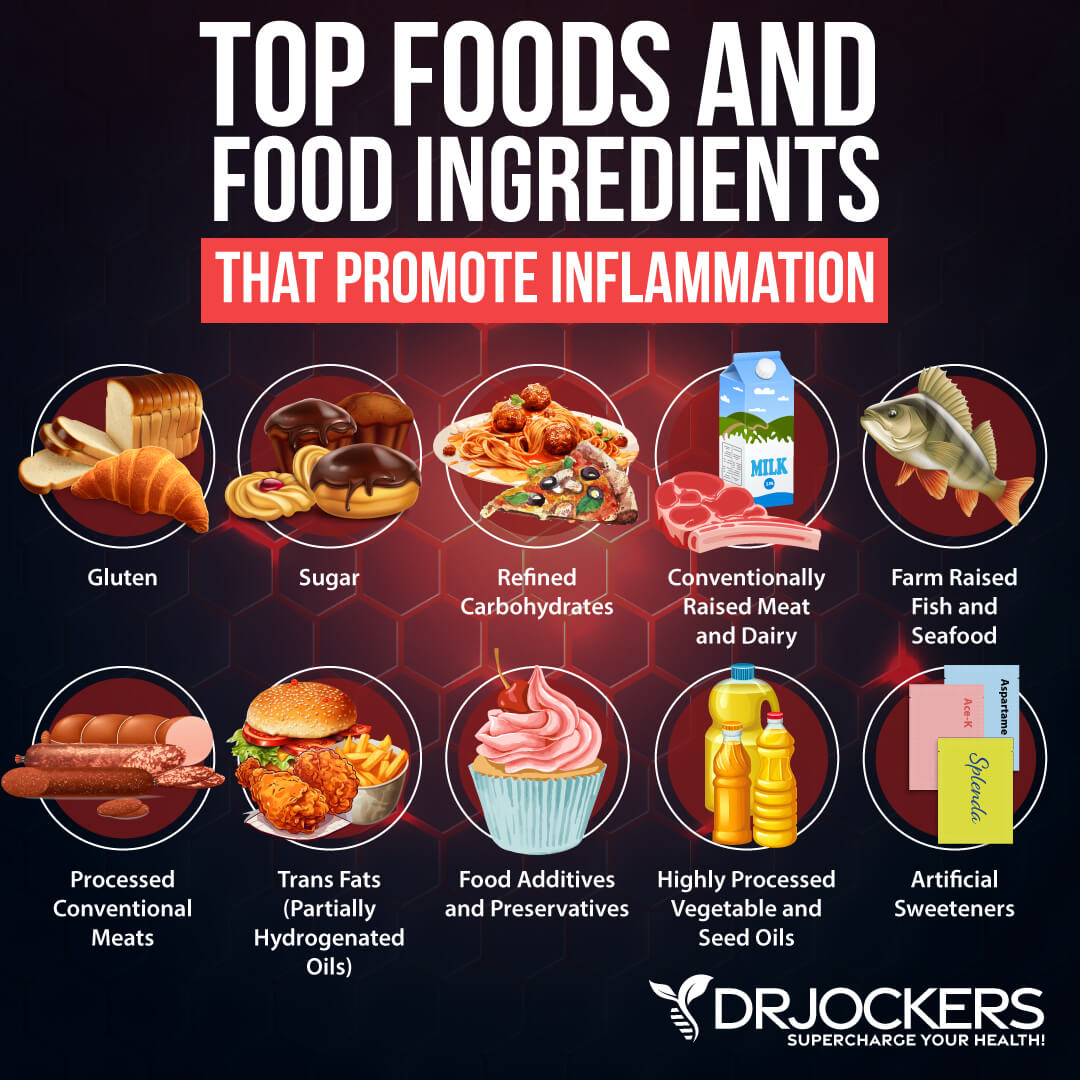
Chronic Stress & Poor Sleep
Chronic stress and poor sleep are both poor lifestyle choices that increase your risk of chronic inflammation and eye damage. Research has found that stress may be associated with higher inflammation levels and inflammatory diseases, including macular degeneration. This increased stress may contribute to disease progression. Furthermore, people with vision changes and macular degeneration may experience more stress, anxiety, or depression, which may lead to further inflammation and macular damage (10).
Sleep is the time of the day when your body can finally rest and repair. If you experience poor sleep, sleep too little, or get interrupted sleep, you are not allowing your cells to regenerate and take care of the damage. You probably know the feeling of tired eyes and an inability to focus when you are tired.
But poor sleep and insomnia may lead to more than just tired eyes. According to a longitudinal case-control study of 15,465 patients, aged 55 and over have found that insomnia may increase the risk of macular degeneration (11).
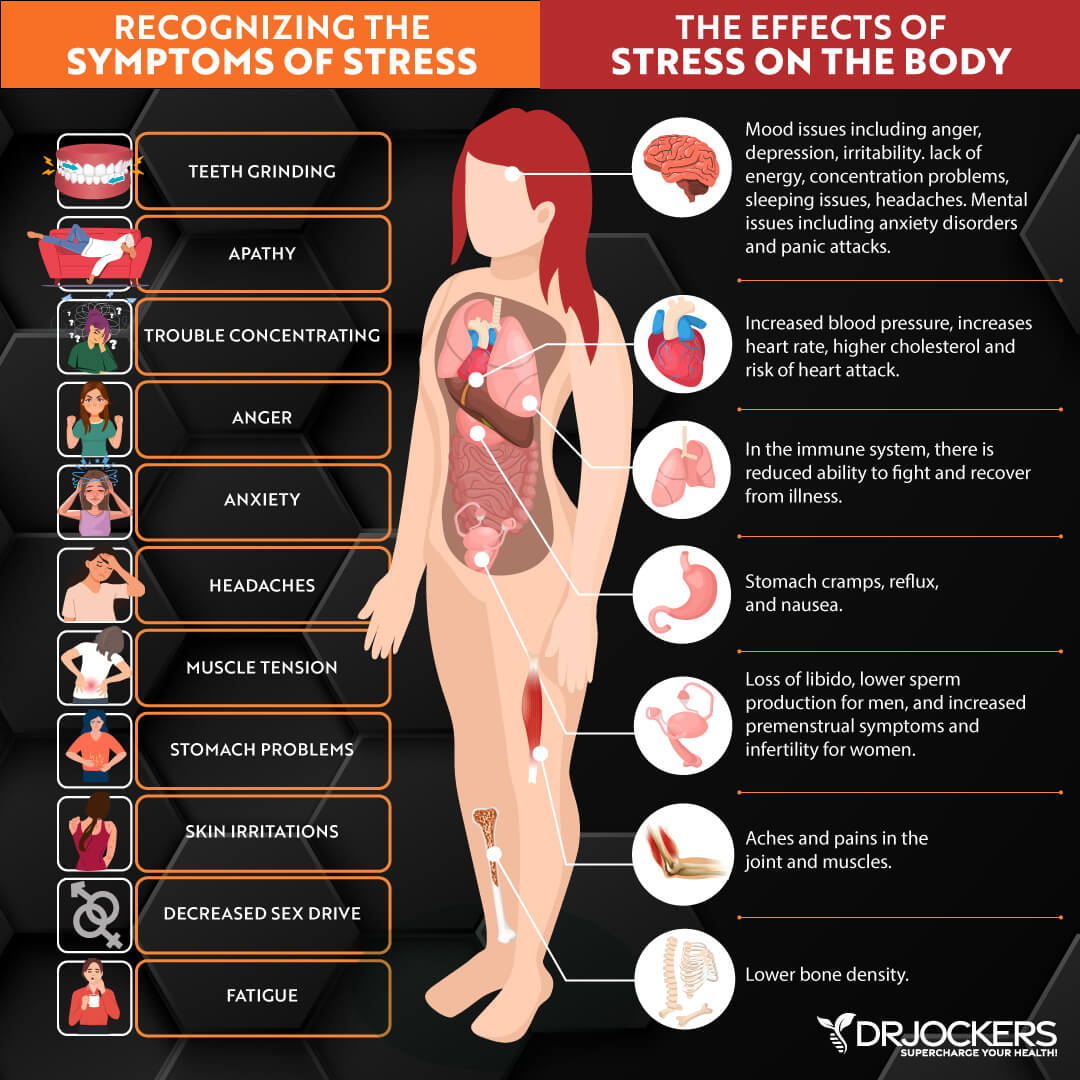
Too Much Screen Time on Devices
Sunlight is made up of a variety of lights, including blue, indigo, violet, red, orange, yellow, and green. These colors are different wavelengths and energy that turn into the white light we see. Red light has less energy and longer wavelengths, whereas blue rays have more energy and shorter wavelengths.
Blue light exposes your eyes to more wavelengths on the blue end of the spectrum. Different sources of blue light include fluorescent light, LED light, flat screen LED televisions, computer monitors, tablet screens, and smartphones.
With the increasing use of technology, blue light exposure is becoming a serious problem. Spending too much time on your technology screens is not only tiring for your eyes but may have long-term negative effects. Research has shown that children’s eyes absorb even more blue light than adults. The problem is that when your cornea, lens, and retina are exposed to blue light, it may affect your vision and may result in premature aging of your eyes (12, 13).
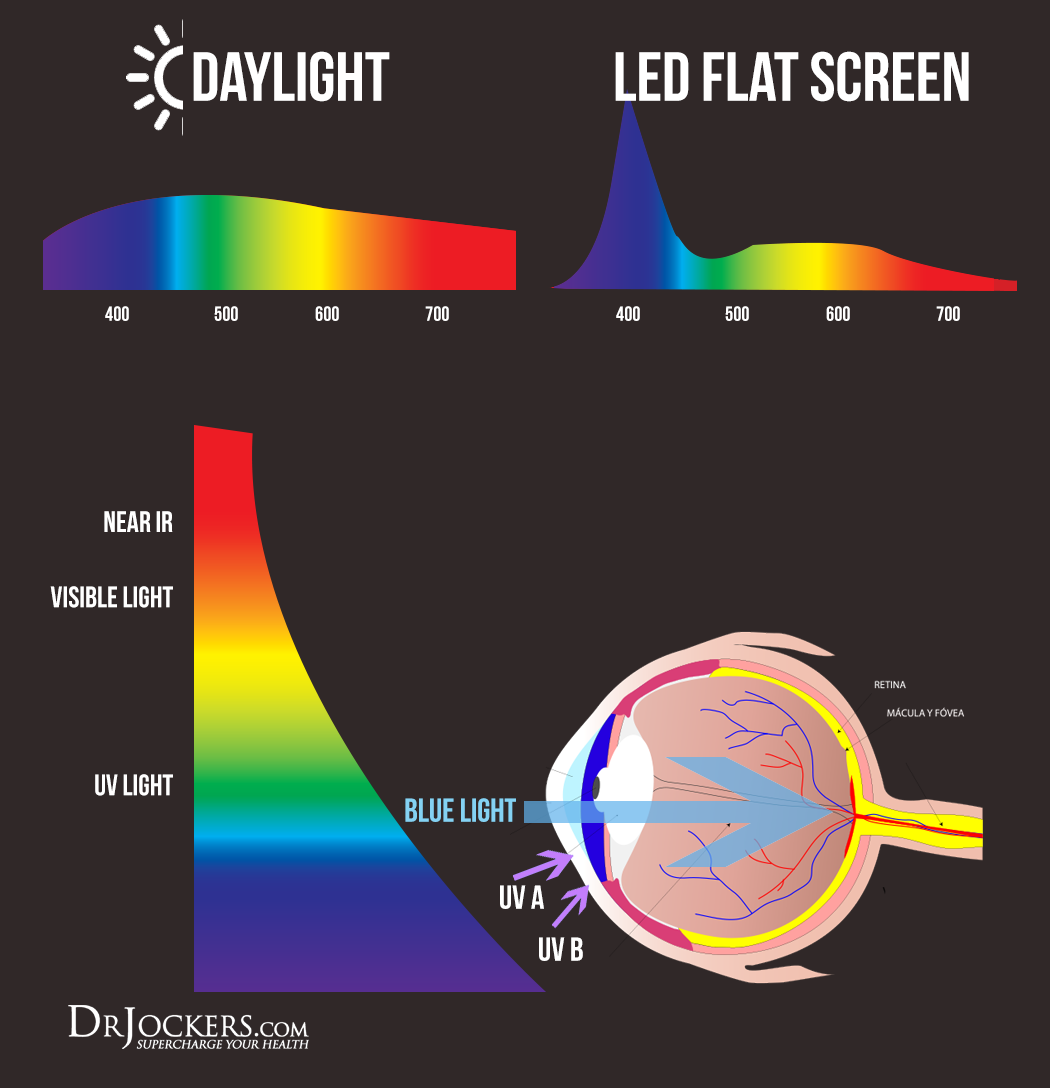
Nutrient Deficiencies with Macular Degeneration
Nutrient deficiencies are one of the main factors behind premature aging, age-related disease, and macular degeneration. There are several nutrients that have specifically been linked to eye damage, and macular degeneration.
Zinc
Zinc is essential for reducing the risk of inflammation and age-related diseases. An open-label clinical study of 72 patients with early macular degeneration looked at the benefits of zinc supplementation for 3 months. Researchers have found that daily administration of 50 mg zinc sulfate may inhibit complement catabolism and may slow disease progression (14).
Vitamin A
Research has found that the intake of antioxidant-rich foods, supplements, and nutraceutical formulas with certain vitamins and minerals may reduce the risk of macular degeneration. Vitamin A is one of the main vitamins that has been linked to the reduction of macular degeneration (15).
Lutein
Lutein is one of the most common nutrients known for eye health. Lutein is a carotenoid with anti-inflammatory properties. Research has shown that it’s a powerful antioxidant that may prevent macular degeneration and related blindness (16).

Quercetin
Quercetin is a plant flavonol found in many fruits, vegetables, leaves, and grains. One study has looked at the protective effect of quercetin against retinal vascular endothelial growth factor (VEGF) inflammatory response. It found that protein kinase B (Akt) was suppressed by quercetin. This is very promising when it comes to macular degeneration prevention (17).
Omega-3 Fatty Acids
Omega-3 fatty acids are healthy fats with anti-inflammatory benefits found in fish, seafood, and algae, as well as in certain seeds, such as hemp, chia, and flax seeds. Research on 75,889 women and 38,961 men over 50 has found that the intake of omega-3 fatty acids using the combination of DHA and EPA may benefit patients with intermediate or advanced macular degeneration (18).
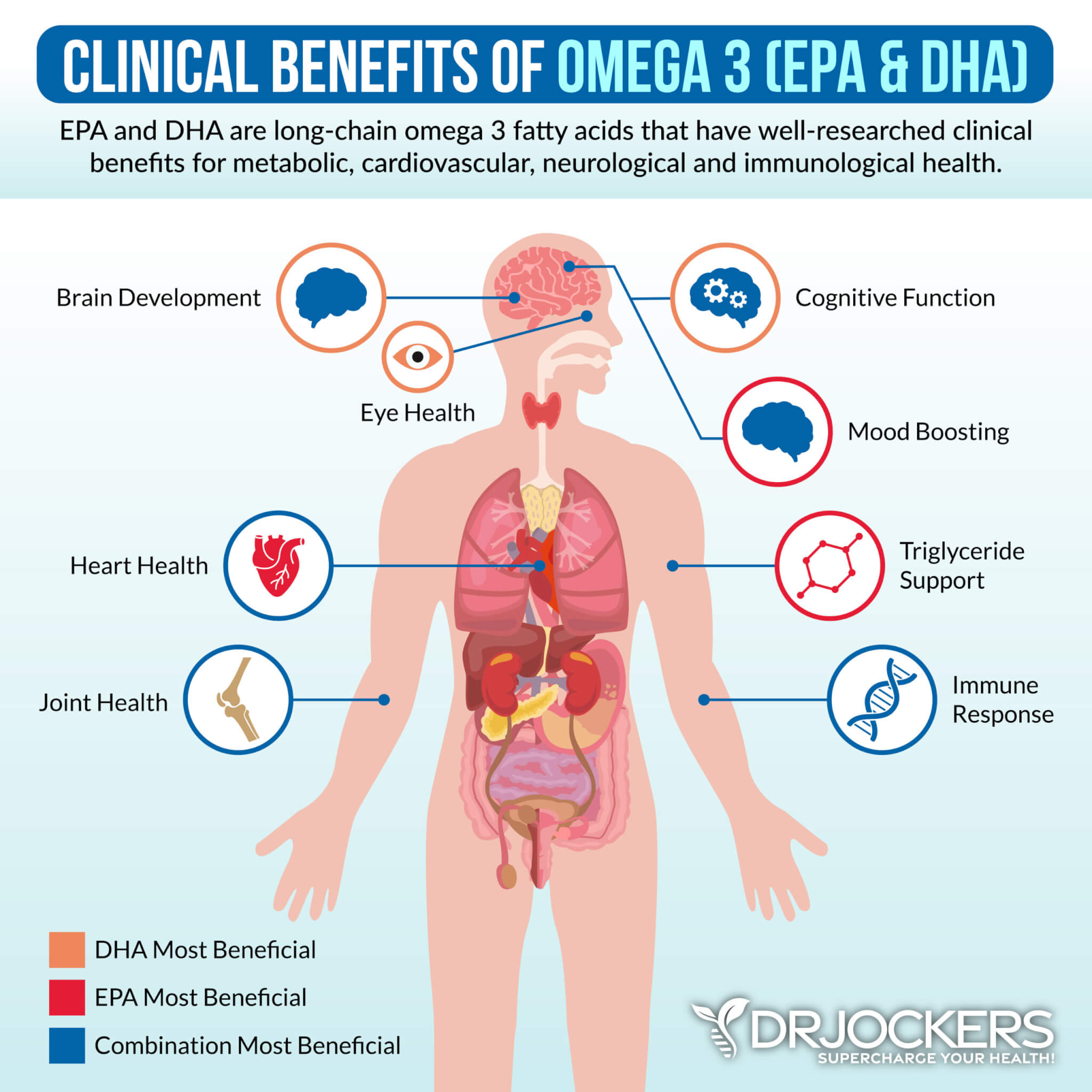
High Levels of Liver Toxicity
Your liver is an important organ that is responsible for detoxification. Traditional Chinese Medicine (TCM) looks at the body differently than traditional doctors. Based on thousands of years of practice, they have found that macular degeneration mainly stems from blood deficiency. According to TCM, your liver stores blood, hence liver toxicity may result in the malnutrition of eyes and macular degeneration (19).
However, it is not only TCM that has connected macular degeneration and eye health to liver toxicity and liver problems, but modern science also has. Research on 5963 participants over the age of 40 has found an association between retinopathy and nonalcoholic fatty liver disease (NAFLD) suggesting that your liver health is crucial when it comes to eye health and the prevention of macular degeneration (20).
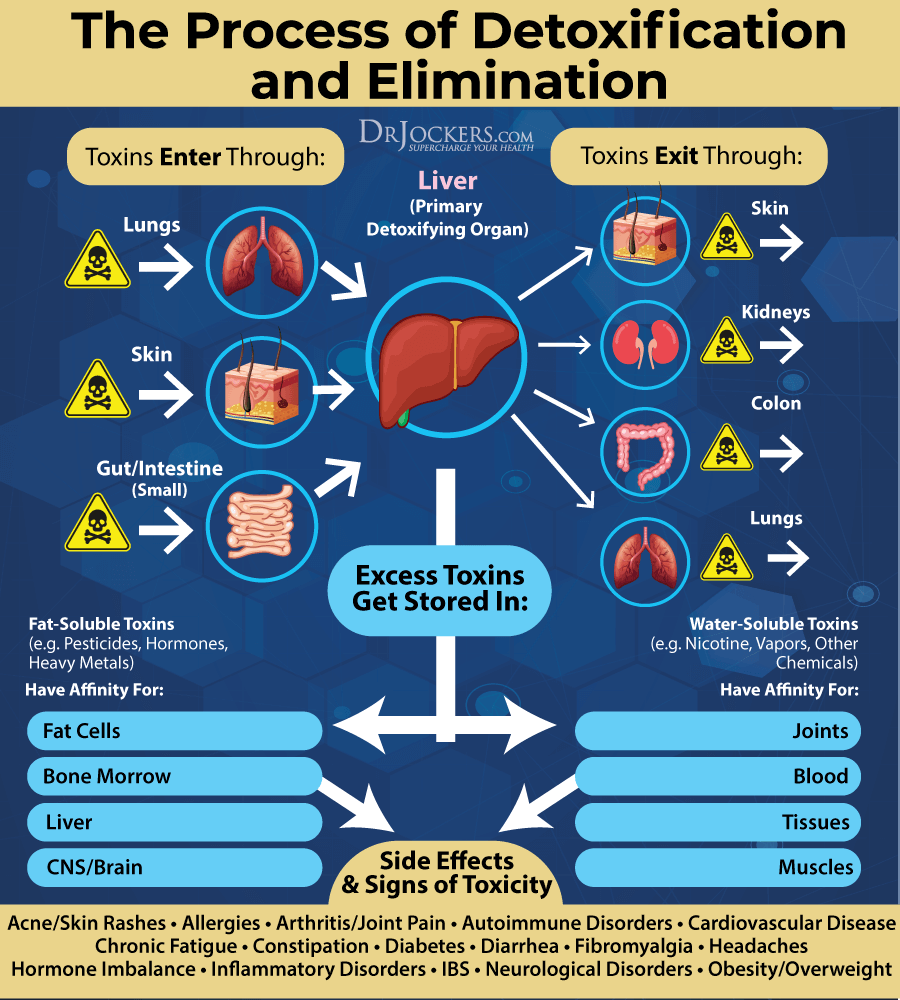
Natural Support Strategies For Macular Degeneration
The good news is that there are a variety of natural strategies you can try to help support macular degeneration. This list could be quite extensive as there are many natural health therapies that can be beneficial, however, I have summarized what I think are the most important things to focus on with this list.
While these strategies are not FDA approved to prevent, mitigate, treat, or cure macular degeneration, they can be very helpful for overall eye health. It all begins with the things we can control, such as our diet, sleep habits, movement, screen time, and hydration. I also review some of the top nutrients and supplements I use with my clients to help them get results.
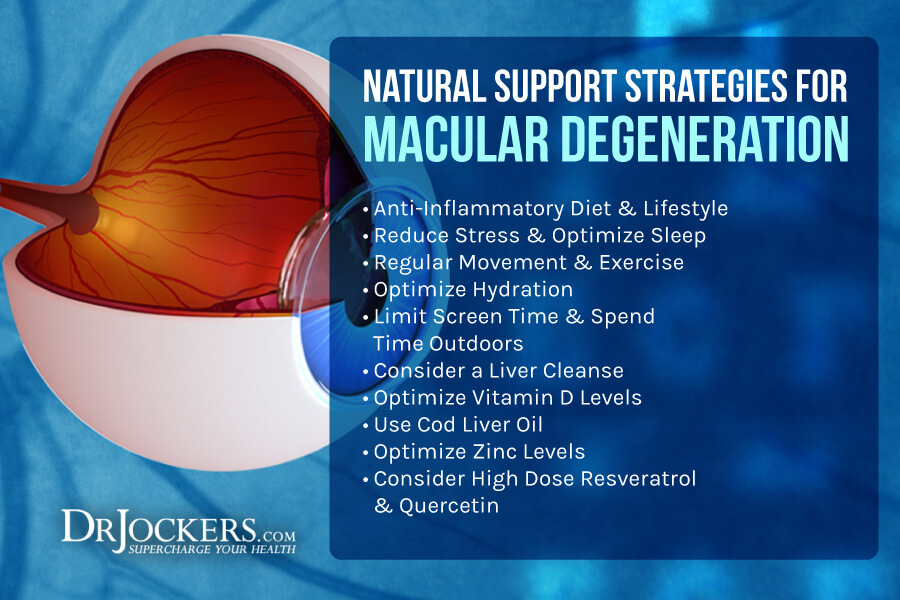
Anti-Inflammatory Diet & Lifestyle
Eating an anti-inflammatory, nutrient-dense diet is crucial when it comes to the prevention and treatment of macular degeneration. Remove all inflammatory foods, including refined sugar and grains, gluten, refined oils, deep-fried and processed foods, grain-fed meat and eggs, conventional dairy, soda, and sugary drinks, and foods that you are sensitive to.
Switch to an anti-inflammatory diet plan with lots of greens, veggies, low glycemic index foods, herbs, grass-fed meat, and wild-caught fish. To learn more about an anti-inflammatory diet, read this article as well.
In addition to a nutrient-dense diet, focus on healthy lifestyle strategies. Stress reduction, good sleep, increased movement, and time outdoors are crucial. Read on to learn more about some healthy lifestyle strategies.
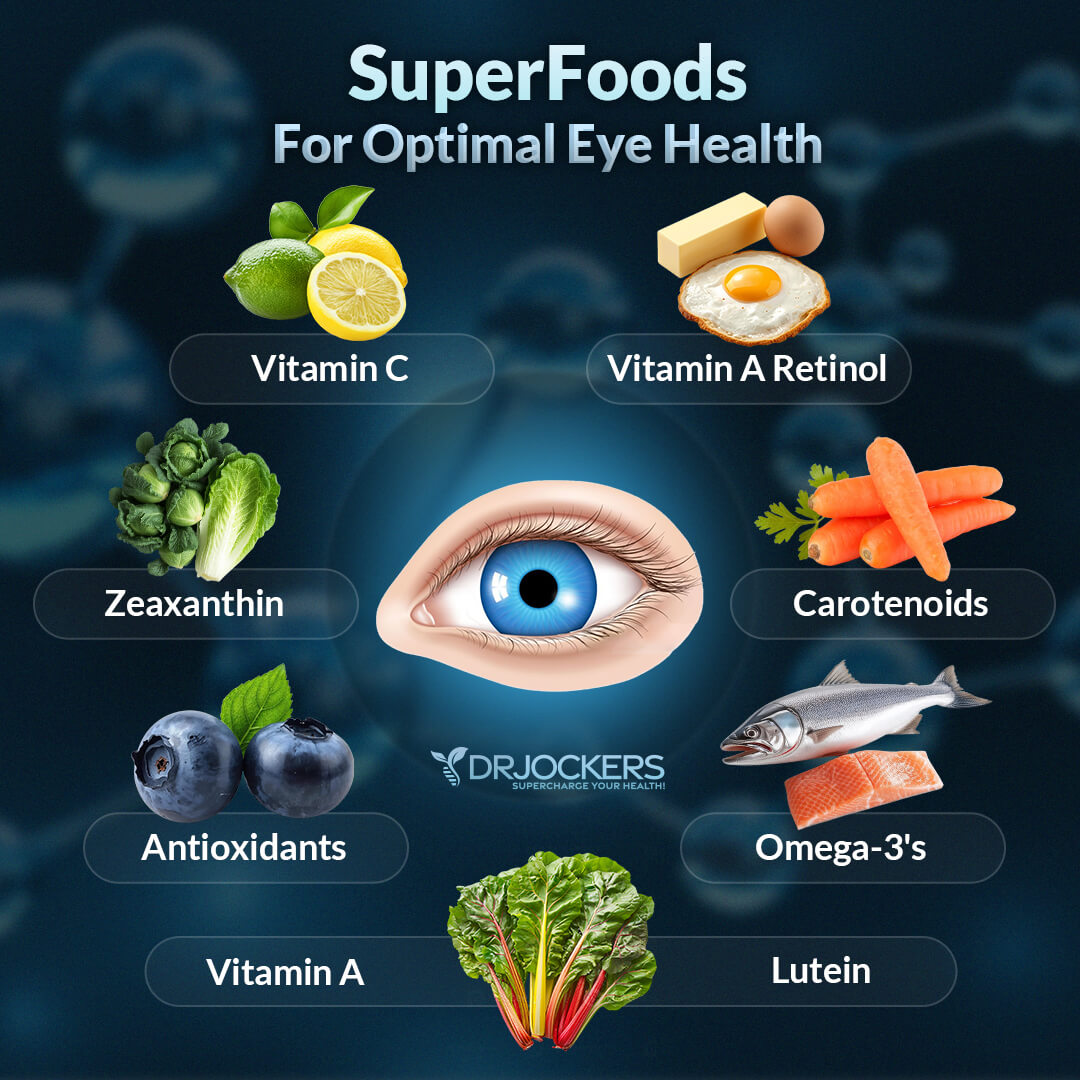
Reduce Stress & Optimize Sleep
Reducing your stress levels is critical for your eye health. To reduce your stress, I recommend regular meditation, breathwork, daily gratitude, prayer, journaling, regular exercise, relaxation recordings, and nature walks.
Learn to shift your thoughts through positive self-talk, reframing your thoughts, and mindset shifts. Working with a health coach, life coach, or therapist may help you to deal with different areas of stress in your life more effectively.
Poor sleep is another contributing factor to inflammation, eye issues, and macular degeneration. Good-quality sleep is essential for rest and repair. Develop a regular relaxing nighttime routine that works for you. Turn off electronics and avoid sugar or caffeine close to bedtime.
Engage in relaxing activities. Meditation, journaling, reading, and board games are great options. Sip on a relaxing herbal tea before turning off the lights while thinking about your daily gratitude.
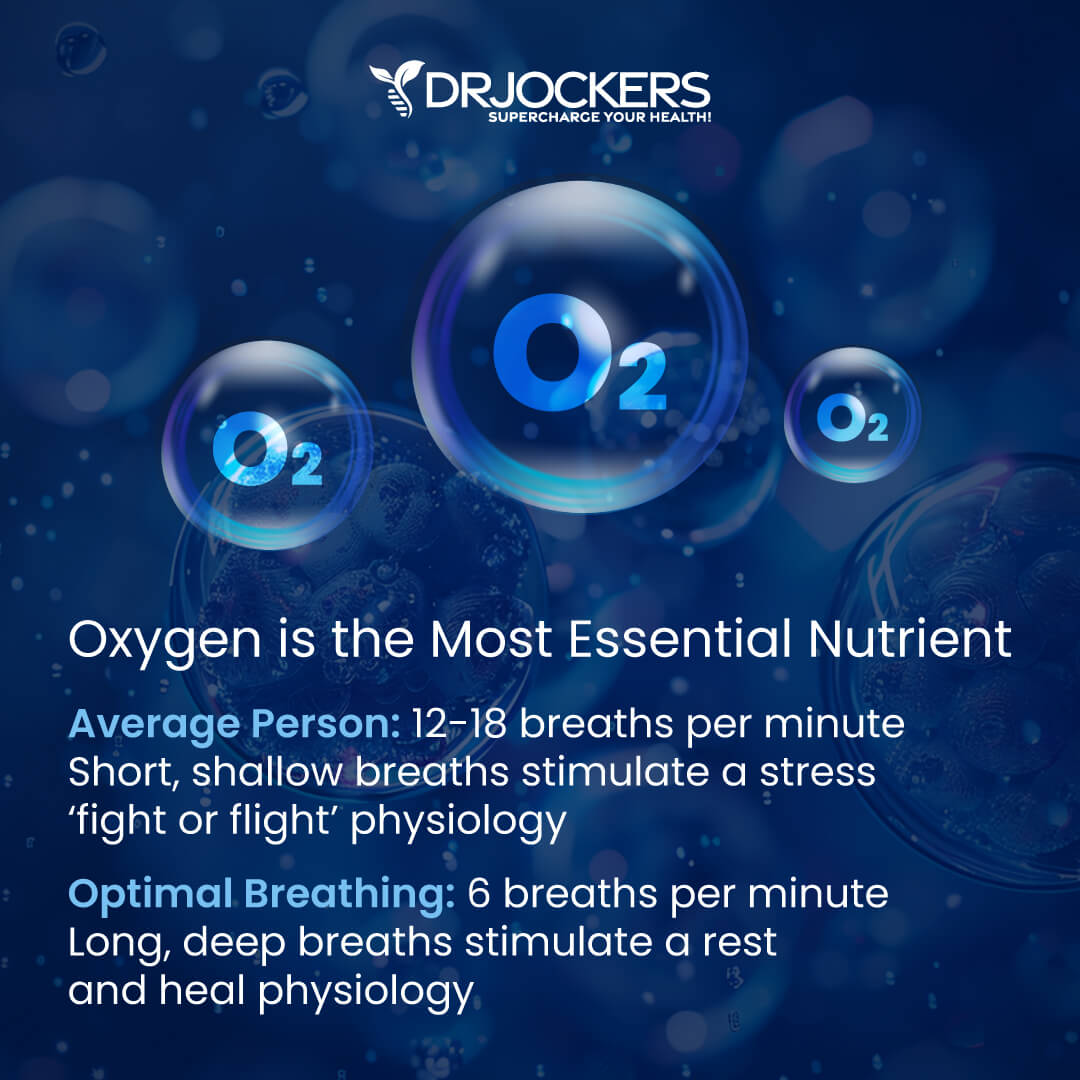
Regular Movement & Exercise
Regular movement and exercise are part of a healthy lifestyle. They help to reduce chronic stress and chronic inflammation in the body. They also help to promote sleep.
As a result, they help to reduce various risk factors of macular degeneration. Move regularly throughout the day by choosing to take the stairs, taking a walk at lunch, stretching regularly, gardening, and dancing to your favorite song.
Exercise at least 20 to 30 minutes minimally 5 times a week. Try a combination of cardiovascular exercise, strength and resistance training, and low-impact exercise. High-intensity interval training (HIIT), weightlifting, walking, and yoga are also beneficial mix that you can engage in throughout the week.
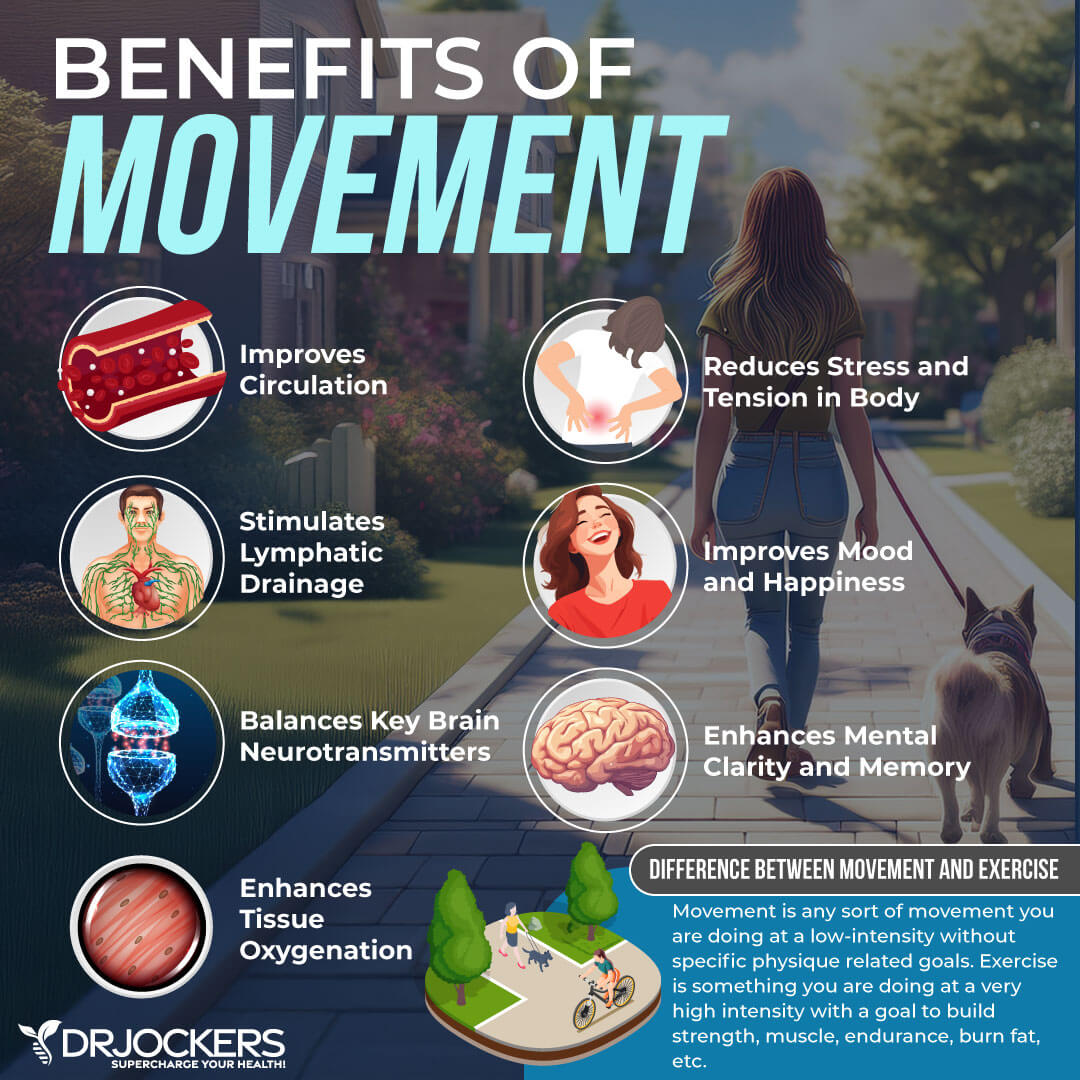
Optimize Hydration
Most of your body is made up of water. Clearly, it’s essential for health, detoxification, and low inflammation levels. Start your day with a large glass of water. Add some lemon or apple cider vinegar for digestion and cleansing support.
Drink 8 to 10 glasses of purified water a day, or more if you need it. Additionally, eat hydrating veggies and fruits and drink green juices, smoothies, and herbal tea.

Limit Screen Time & Spend More Time Outdoors
Blue light exposure not only strains your eyes but may also lead to macular degeneration and long-term eye damage. Limit your screen time as much as possible to only the necessary amount of time. Turn off your phone, tablet, and laptop unless you need it.
Avoid all electronics at least two hours before bedtime. Spend more time outdoors. Go for a walk in the park, go for a hike, try some grounding, do some gardening, go for a run or a bike ride, or play in the snow.
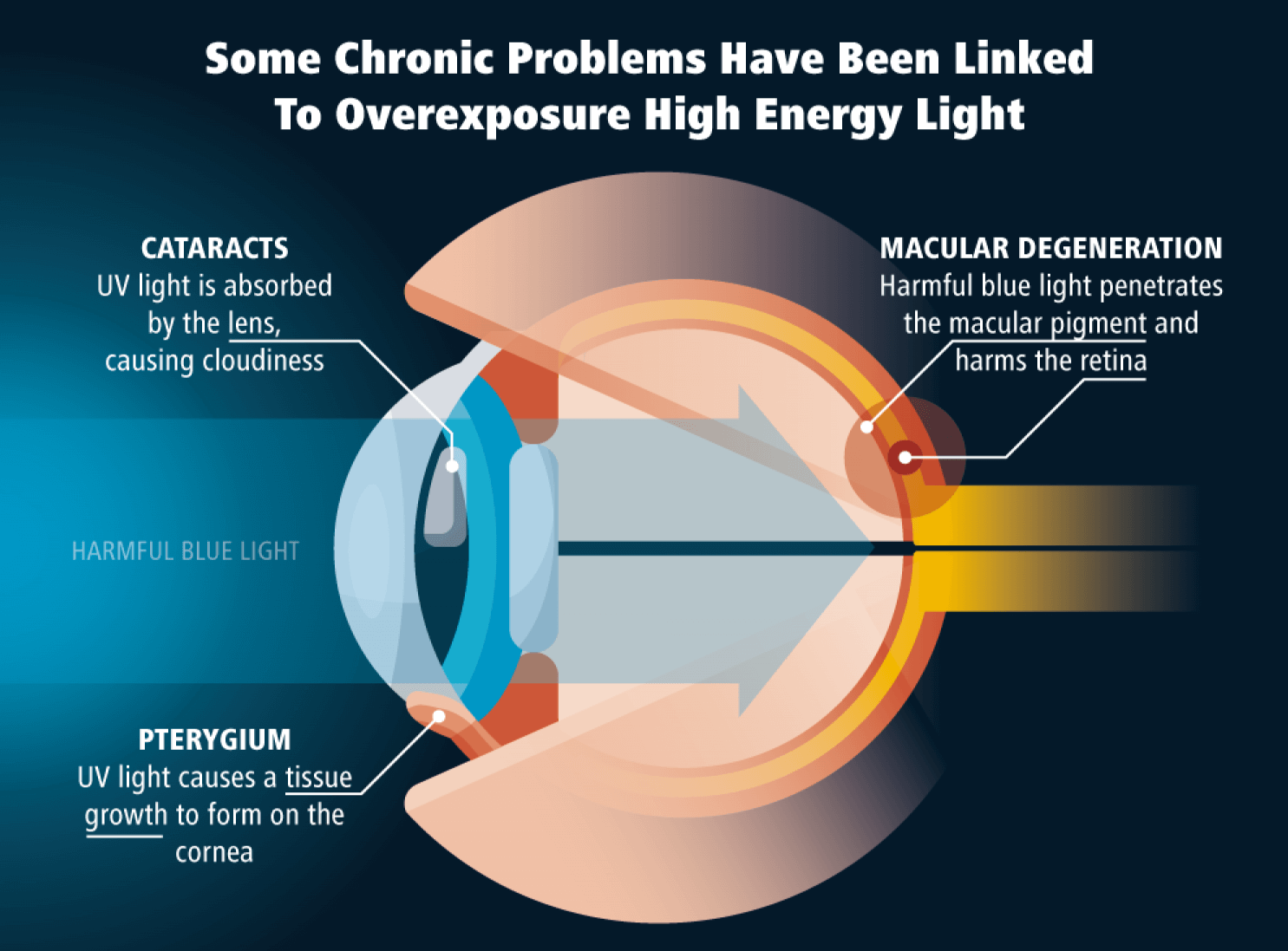
Consider a Liver Cleanse
As you’ve learned, liver toxicity may contribute to inflammation, eye health issues, and macular degeneration. Liver supporting foods, such as beets, green tea, grapefruit, garlic, and berries are certainly beneficial, however, they may not be enough.
A liver cleanse may just be what you need to turn your health around. To learn more about how to do a liver cleanse, I recommend this article.
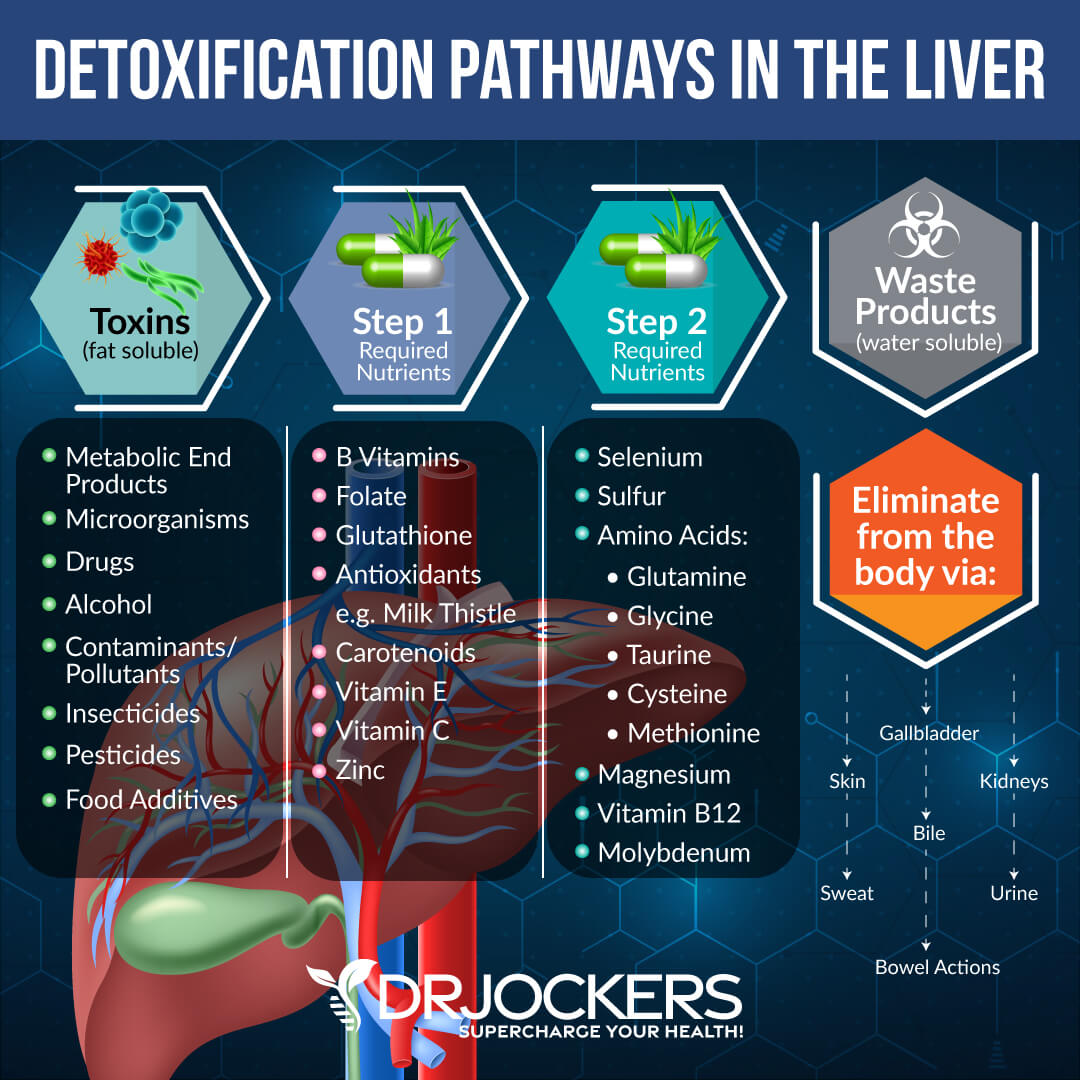
Optimize Vitamin D Levels
Vitamin D is essential for your overall health and the American Optometric Association recommends vitamin D for eye health and age-related macular degeneration. One of the best ways to improve your vitamin D levels is by spending time in the sun.
However, since we spend so much of our time indoors, it’s impossible to meet all your vitamin D needs from the sun alone. To optimize your vitamin D levels, I recommend eating vitamin D-rich foods, such as fatty fish, beef liver, and eggs, and supplementation with vitamin D.
You should also consider supplementing with vitamin D to get your levels up to the optimal range of 50-100 ng/ml. Typically supplementing with around 1,000 IU’s per 25 lbs of body weight will get you into that range, however, some people absorb vitamin D better than others, so it is important to test every 6 months or so to see where your levels are.
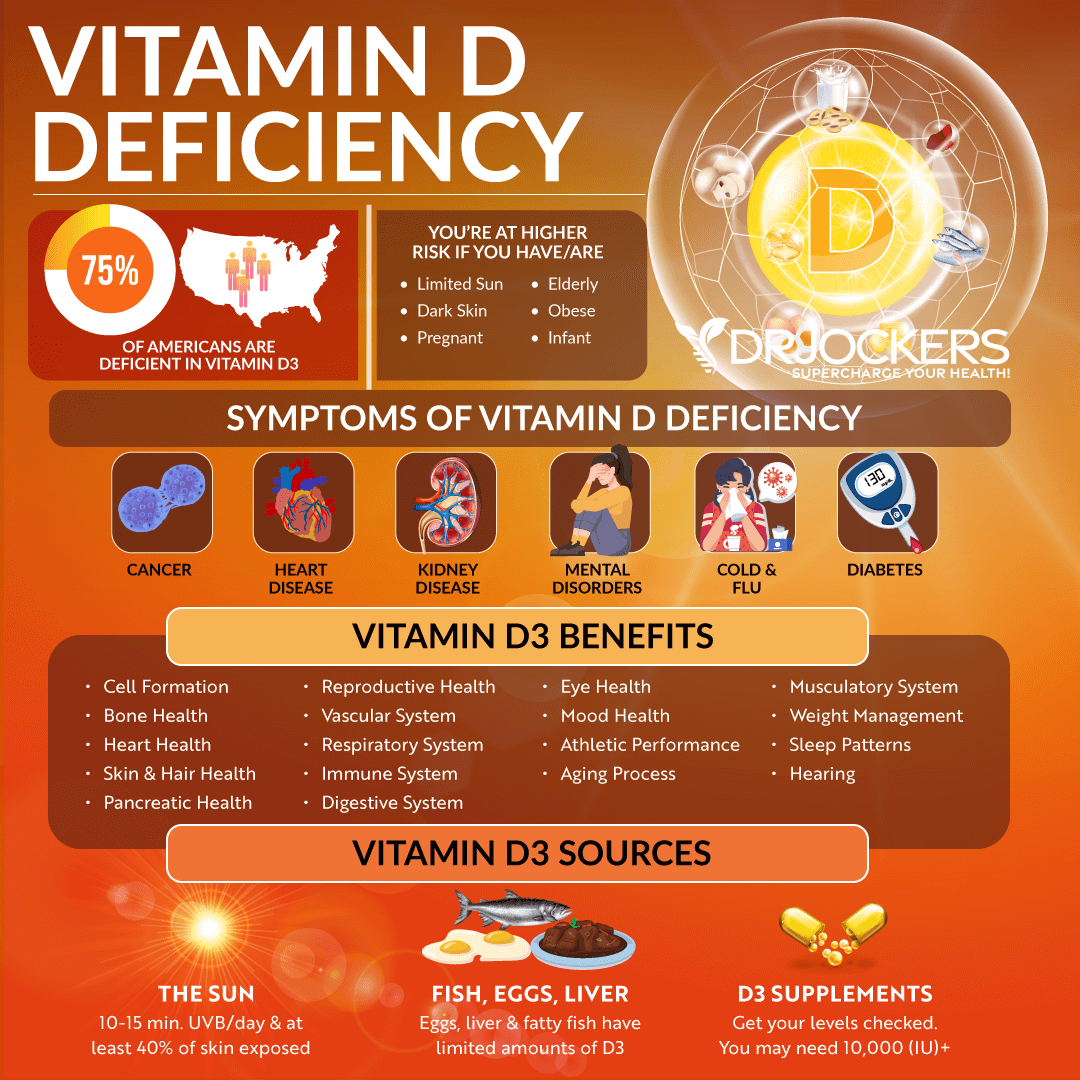
Use Cod Liver Oil for Macular Degeneration
Improving your omega-3 levels is critical for your eye health. Cod Liver oil is one of the world’s best sources of the omega 3 fatty acids EPA and DHA. Cod Liver oil is one of the world’s best sources of the omega 3 fatty acids rich in both EPA and DHA. DHA is the most important essential fat for good eye health and EPA also plays a helpful role.
In addition, Cod Liver oil is a fantastic source of retinol which is the vital fat-soluble form of vitamin A that is so helpful for good vision. On top of that, it also supplies us with vitamin D. Many brands have it in either a capsule form or a lemon-flavored oil, so it doesn’t taste bad at all and is easy to swallow.
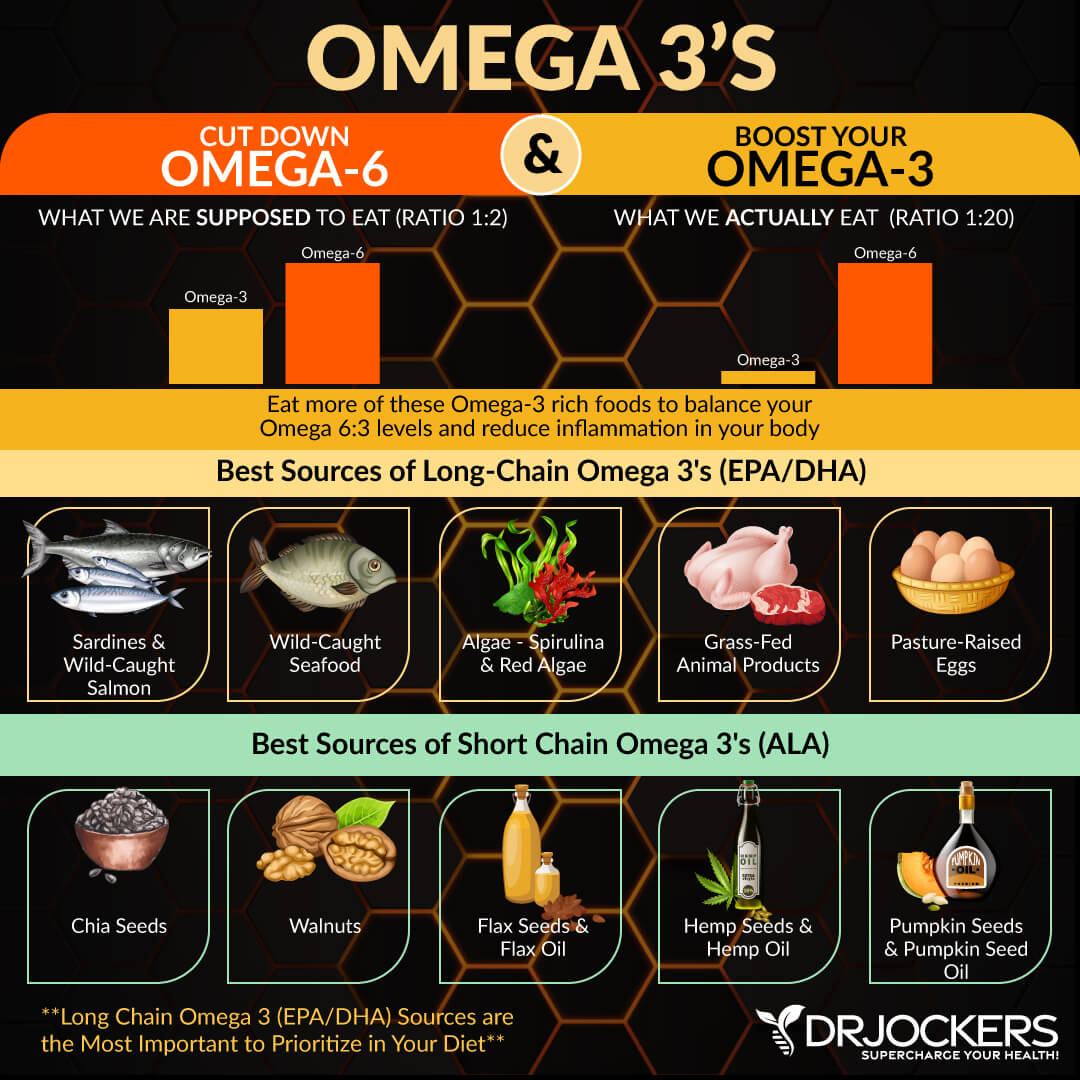
Optimize Zinc Levels
Improving your zinc levels may be beneficial for your eye health. I recommend grass-fed meats, organ meats, such as liver, ghee, wild-caught fish and seafood, vegetables, and if tolerated, egg yolk.
Antioxidants such as glutathione are essential for your eye health. To protect your eyes if you are at risk for eye degeneration or are experiencing it, I recommend supplementing with these ingredients.
Other good nutrients to look for include bilberry extract, N-Acetyl Cysteine (NAC), alpha lipoic acid, and lycopene which all work to support healthy eye structure and function, reduce inflammation, and protect the macula, retina, and lens from oxidative damage.
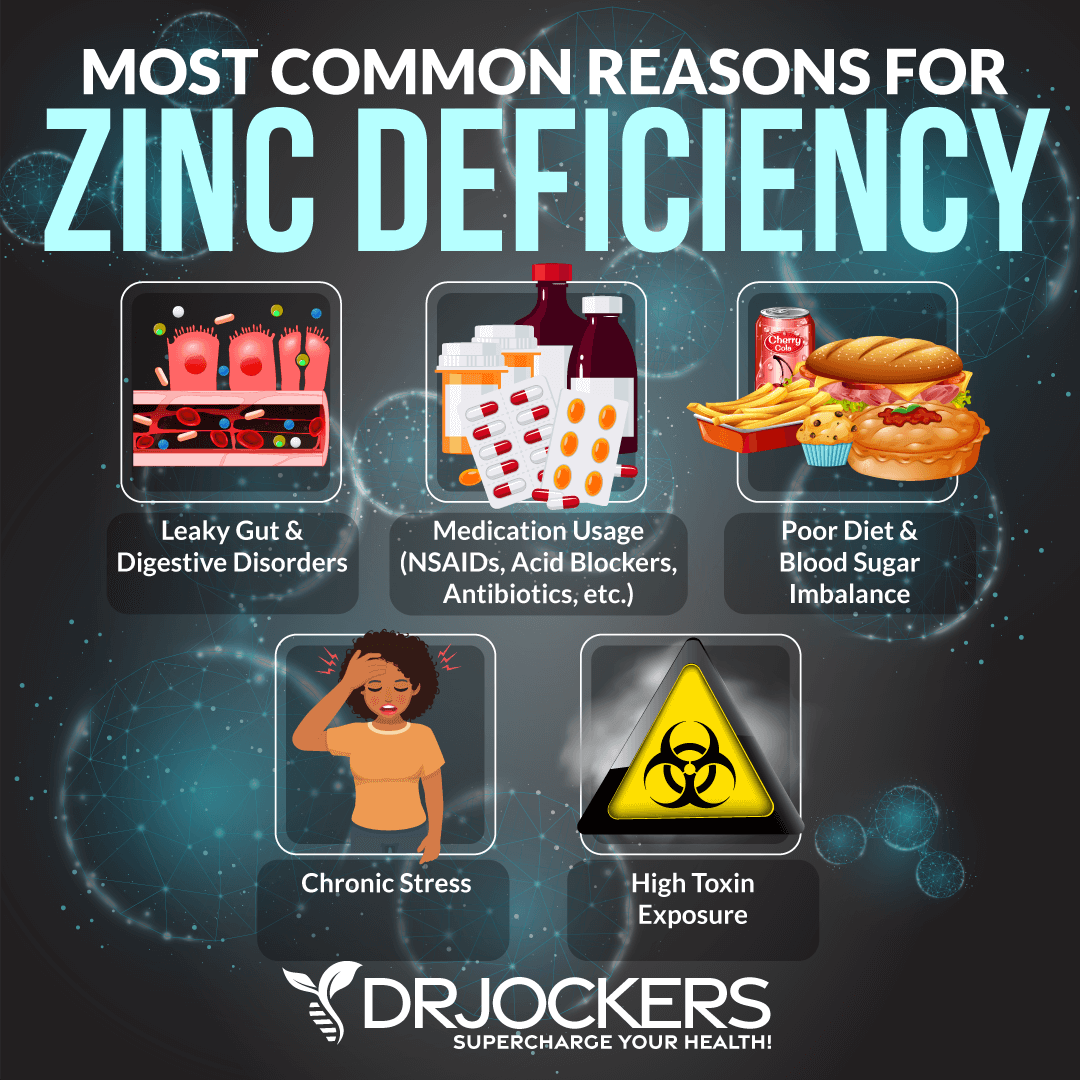
Consider High Dose Resveratrol & Quercetin
Resveratrol and quercetin are both beneficial for your eyes and overall health. They both work very effectively to reduce oxidative stress on the optic nerve and retina.
A population-based control study has found that flavonoids may help to decrease the risk of macular degeneration. Resveratrol and quercetin are two potent flavonoids that may help to prevent oxidative stress on the macula. According to research, resveratrol may delay cataract formation and may have anti-cataract effects on those with diabetes.
This is why I recommend you consider getting more resveratrol and quercetin. They work together to help support your eye health, improve the inflammatory response, support mitochondrial function, and support your overall health (22, 23, 24).
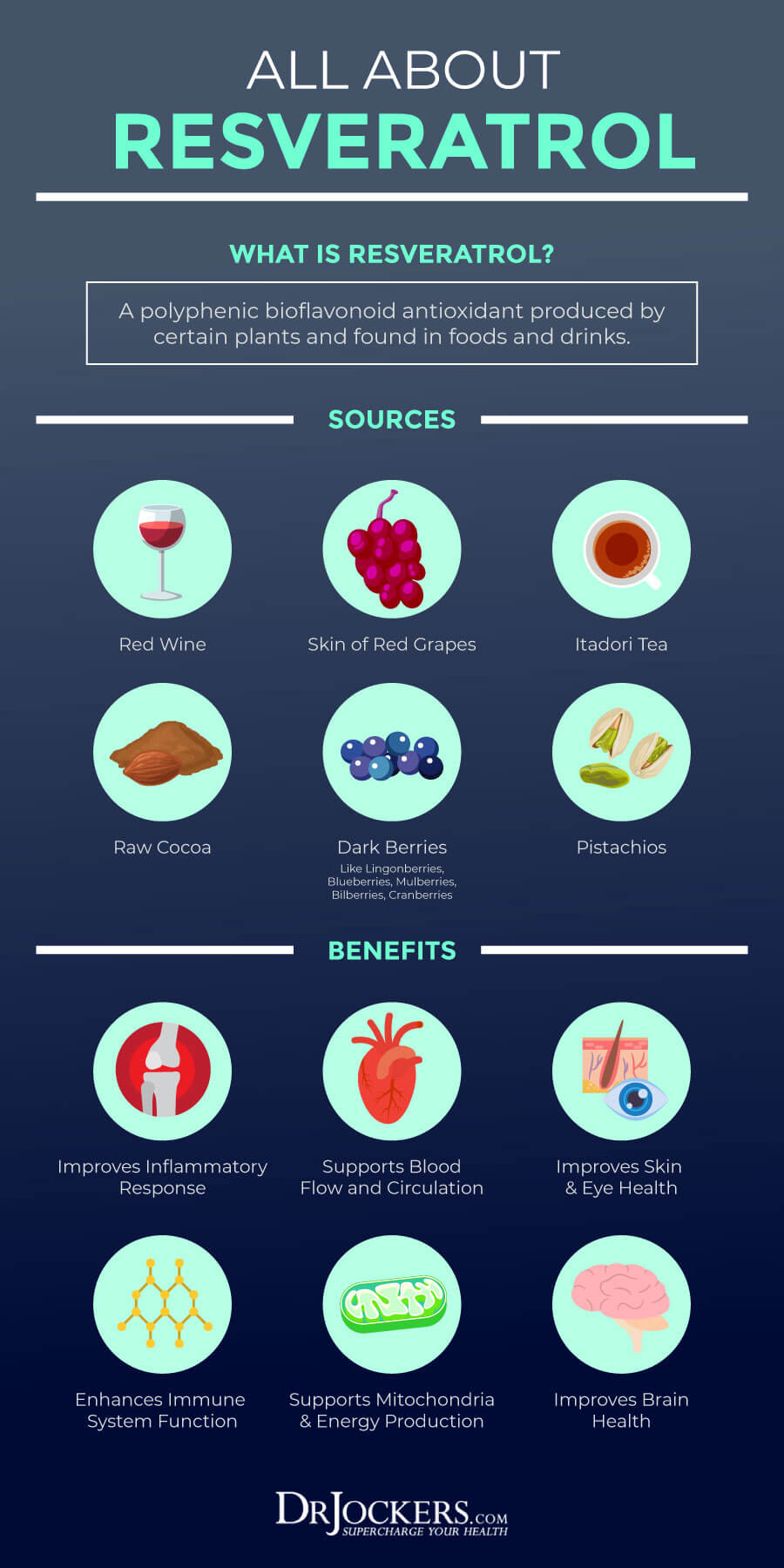
Final Thoughts on Macular Degeneration
Macular degeneration is an increasingly prevalent eye condition. It is caused by a variety of factors, including chronic inflammation, poor diet and lifestyle, poor sleep, and liver toxicity.
However, there are several simple dietary and lifestyle changes you can make to prevent macular degeneration and damage your eyes further. Following my steps as outlined in this article will help to prevent macular degeneration and to improve your overall eye health.
If you want to work with a functional health coach, I recommend this article with tips on how to find a great coach. On our website, we offer long-distance functional health coaching programs. For further support with your health goals, just reach out—our fantastic coaches are here to support your journey.
Inflammation Crushing Ebundle
The Inflammation Crushing Ebundle is designed to help you improve your brain, liver, immune system and discover the healing strategies, foods and recipes to burn fat, reduce inflammation and Thrive in Life!
As a doctor of natural medicine, I have spent the past 20 years studying the best healing strategies and worked with hundreds of coaching clients, helping them overcome chronic health conditions and optimize their overall health.
In our Inflammation Crushing Ebundle, I have put together my very best strategies to reduce inflammation and optimize your healing potential. Take a look at what you will get inside these valuable guides below!




Great article Dr Jockers! Always learn something new from your emails and other posts! Loved your KETO MASTERCLASS ALSO❤️! So much good info for turning around one’s life!
Thanks so much Sharon! Blessings to you!!
Great explanation of macular degeneration.
? your first picture comparing dry to wet…the dry shows white circles in the trees and people,
the second shows black circles in the same tree picture…
however, in the ambulance photos both are black circles…is that a mistake should the ambulance dry be white as well or is it depicting the progression changes?
Also what do you know about the Guardion Company that promotes glaucocetin and lumega-Z for the eyes?
Hey Kathleen,
The wet form is more central and more disruptive in comparison to the dry form. I don’t know anything about Guardion company. Blessings!